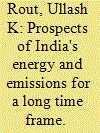|
|
|
Sort Order |
|
|
|
Items / Page
|
|
|
|
|
|
|
| Srl | Item |
| 1 |
ID:
093526


|
|
|
|
|
| Publication |
2010.
|
| Summary/Abstract |
Given its importance as a practical phenomenon underlying the progress of learning technologies, attention should be paid to the role of subsidisation in learning theory, particularly in the case of nascent climate-related sociable learning technologies, in order to examine its benefits. Thus, this study focuses on subsidy procurement of energy technologies in several economies in the context of the component learning track in endogenous global clusters in order to suggest improvements to the adoption mechanism and examine the climate stabilization constraint. At the same time, the study attempts to determine the global progress ratio of the lithium-ion battery in order to analyse various endogenous learning scenarios for hybrid technologies. An integrated energy system model with highly disaggregated global regions (DNE21+) is used to execute this research in a medium time frame. Subsidisation of the learning track of battery technology encourages greater development of plug-in hybrid vehicles, promotes early diffusion of hybrid technologies, and relieves heavy dependency on crude oil and biofuels. The subsidies in the common learning domains in few economies benefit the nearby economies because of the technology spillover that occurs through numerous cross-feedback learning mechanisms. Endogenous learning with subsidies augments diffusion potentials, abates emissions, and shifts sectoral emissions.
|
|
|
|
|
|
|
|
|
|
|
|
|
|
|
|
| 2 |
ID:
109454


|
|
|
|
|
| Publication |
2011.
|
| Summary/Abstract |
For any nation, sector-wise forecasts of energy demand and emissions are becoming valuable elements in devising its national and international policies relating to energy security, local environment, and global climate change. It is in this context that this work attempts to forecast India's possible energy demands and emissions adopting a key indicator approach on least cost generation expansion optimization methodology for a long time frame. This study developed key indicators for useful-energy demand for end-use sectors such as industry, commerce, and residence. Key indicators for transport sector and non-energy use sectors were developed on transport mobility demand and end-use fuel demand. The main drivers of these key indicators are socio-economic parameters. This work was conducted in a linear programmed (LP) TIMES G5 model on TIMES modeling framework for model horizon of 1990-2100. By the end of the 21st-century, India's energy demands are projected to be about 1825 Mtoe of primary energy, 1263 Mtoe of final energy consumption, 4840 TWh of electricity generations, 723 Mtoe of energy import, and 4414 Mt of CO2 emissions.
|
|
|
|
|
|
|
|
|
|
|
|
|
|
|
|
| 3 |
ID:
092833


|
|
|
|
|
| Publication |
2009.
|
| Summary/Abstract |
The diffusion of promising energy technologies in the market depends on their future energy production-cost development. When analyzing these technologies in an integrated assessment model using endogenous technological learning, the uncertainty in the assumed learning rates (LRs) plays a crucial role in the production-cost development and model outcomes. This study examines the uncertainty in LRs of some energy technologies under endogenous global learning implementation and presents a floor-cost modeling procedure to systematically regulate the uncertainty in LRs of energy technologies. The article narrates the difficulties of data assimilation, as compatible with mixed integer programming segmentations, and comprehensively presents the causes of uncertainty in LRs. This work is executed using a multi-regional and long-horizon energy system model based on "TIMES" framework. All regions receive an economic advantage to learn in a common domain, and resource-ample regions obtain a marginal advantage for better exploitation of the learning technologies, due to a lower supply-side fuel-cost development. The lowest learning investment associated with the maximum LR mobilizes more deployment of the learning technologies. The uncertainty in LRs has an impact on the diffusion of energy technologies tested, and therefore this study scrutinizes the role of policy support for some of the technologies investigated.
|
|
|
|
|
|
|
|
|
|
|
|
|
|
|
|
|
|
|
|
|